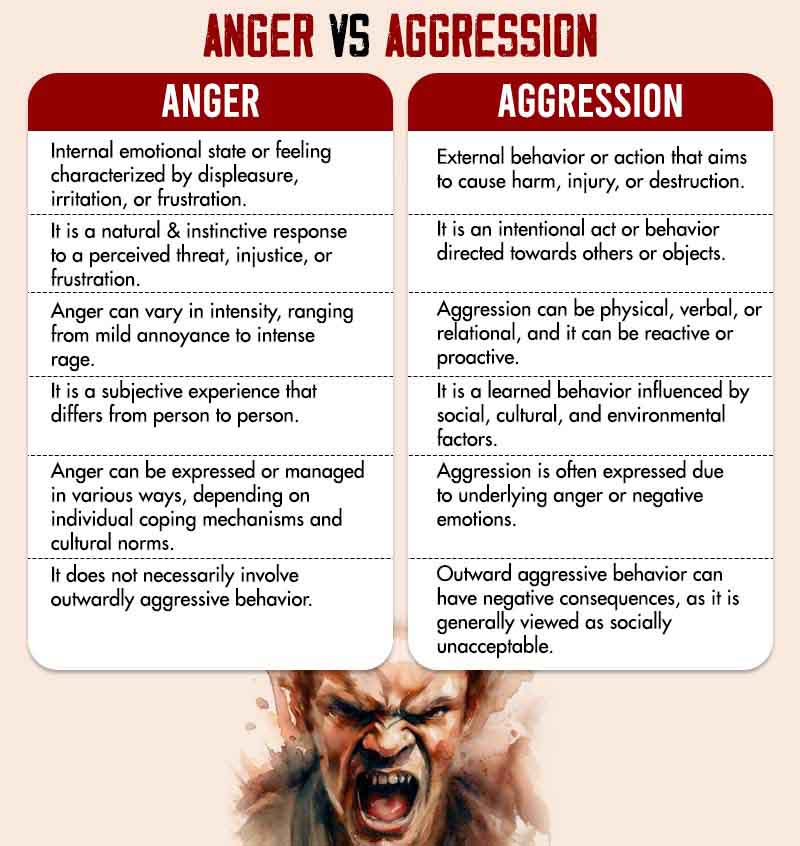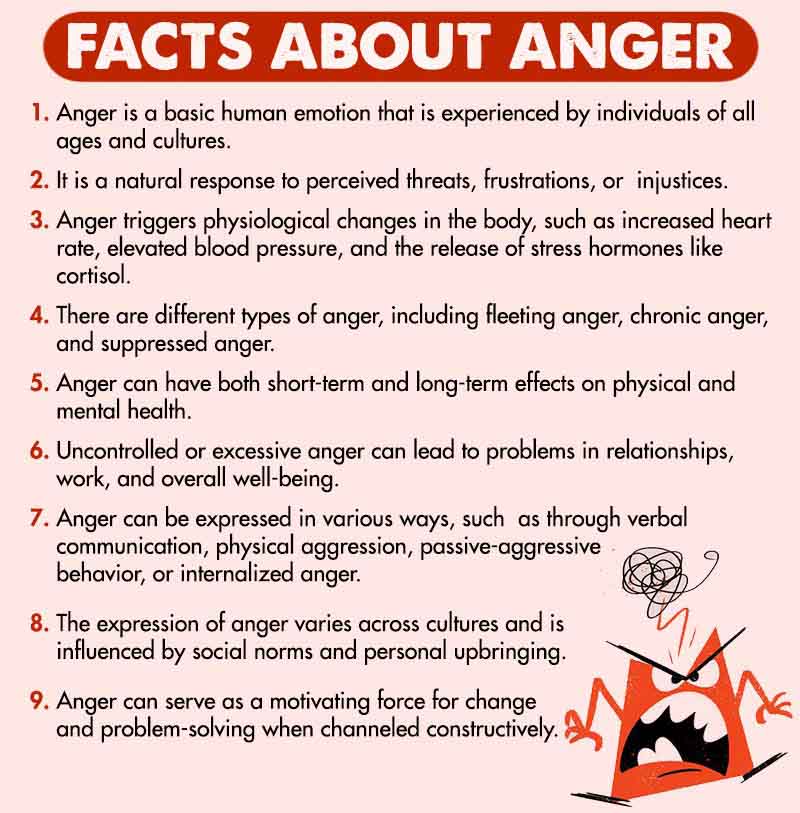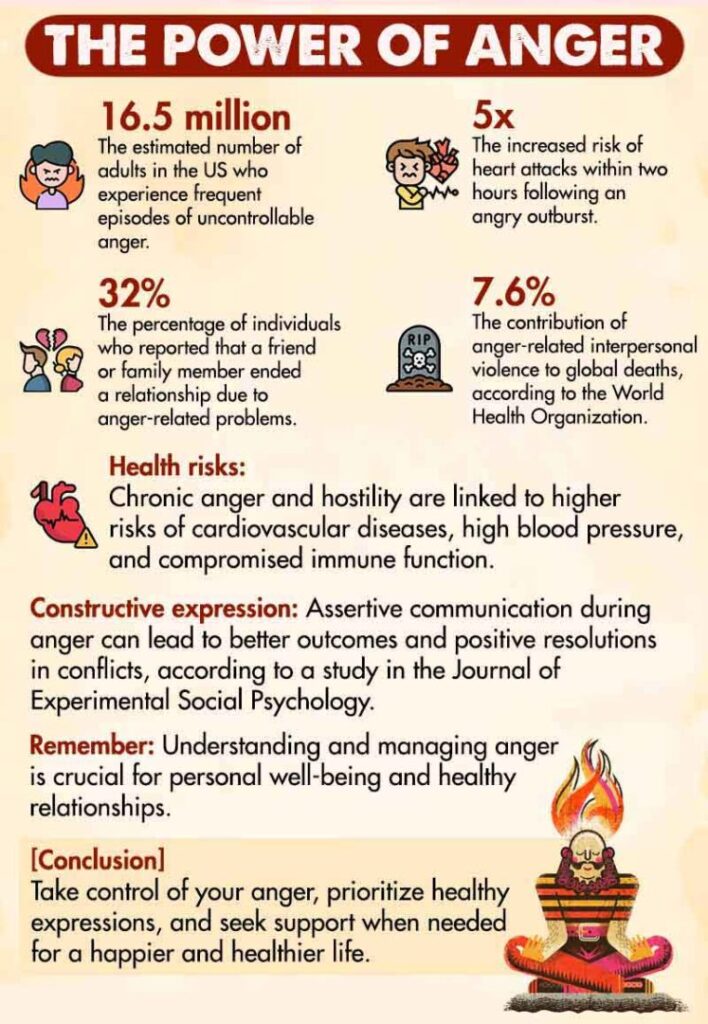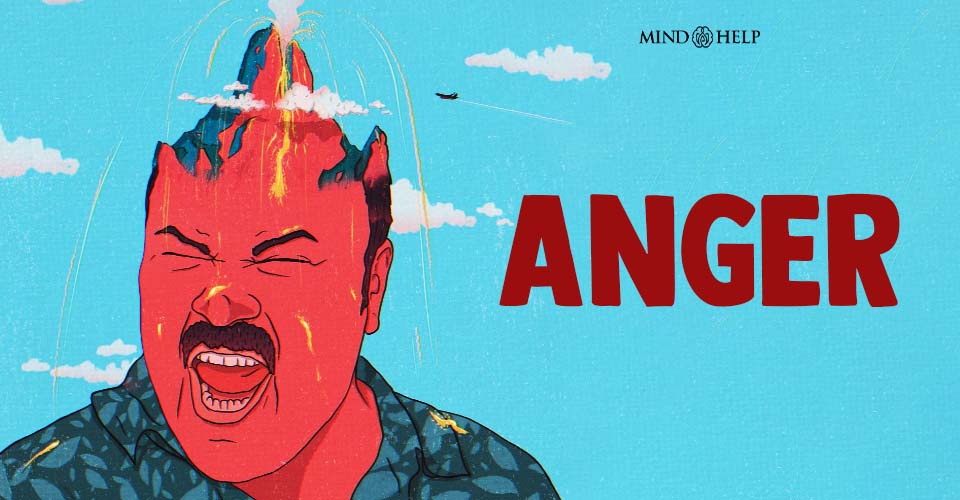Table of Contents
What is anger, and why does it arise so instinctively when we’re faced with distress, be it emotional, psychological, or physical? Let’s learn how we can understand its role in our lives.
What Is Anger?
Anger is a complex and powerful emotion characterized by feelings of displeasure, frustration, and a strong desire to express hostility or retaliate. It is a natural human response 1 Williams R. (2017). Anger as a Basic Emotion and Its Role in Personality Building and Pathological Growth: The Neuroscientific, Developmental and Clinical Perspectives. Frontiers in psychology, 8, 1950. https://doi.org/10.3389/fpsyg.2017.01950 that arises in various situations, such as when one’s boundaries are violated, expectations are unmet, or perceived injustices occur.
Anger can manifest in different ways, ranging from mild irritation to intense rage, and it often accompanies physiological changes 2 Staicu, M. L., & Cuţov, M. (2010). Anger and health risk behaviors. Journal of medicine and life, 3(4), 372–375. , including increased heart rate, elevated blood pressure, and heightened adrenaline levels. It also enhances the susceptibility to severe mental health conditions like anxiety disorders, impulse control disorders, etc., and might have a long-term impact on regularizing mental health functioning.
What are anger issues?
Anger issues refer to difficulties in managing anger in a healthy and constructive manner. Individuals with anger issues may experience frequent, intense, or prolonged episodes of anger that are disproportionate to the triggering events. They may also struggle to control their anger, leading to harmful consequences for themselves (like broken relationships or ill-repute).
Other signs of anger issues include physical and verbal aggression, holding grudges, as well as experiencing intense feelings of irritability, frustration, or resentment on a regular basis. Anger issues are common 3 Okuda, M., Picazo, J., Olfson, M., Hasin, D. S., Liu, S. M., Bernardi, S., & Blanco, C. (2015). Prevalence and correlates of anger in the community: results from a national survey. CNS spectrums, 20(2), 130–139. https://doi.org/10.1017/S1092852914000182 in men, children, and the elderly, compared to women.

Signs Of Anger Issues
The common 4 Garfinkel, S. N., Zorab, E., Navaratnam, N., Engels, M., Mallorquí-Bagué, N., Minati, L., Dowell, N. G., Brosschot, J. F., Thayer, J. F., & Critchley, H. D. (2016). Anger in brain and body: the neural and physiological perturbation of decision-making by emotion. Social cognitive and affective neuroscience, 11(1), 150–158. https://doi.org/10.1093/scan/nsv099 signs of anger include:
- Increased heart rate and blood pressure
- Tensed muscles and clenched fists
- Flushed or red face
- Rapid breathing or hyperventilation
- Pacing or restlessness
- Intense physical energy or agitation
- Aggressive or confrontational body language (e.g., raised voice, clenched jaw)
- Verbal outbursts, yelling, or cursing
- Physical aggression, such as hitting objects or slamming doors
- Withdrawal or silent treatment
- Impulsive or reckless behavior
- Difficulty concentrating or becoming easily distracted

Common Anger Expressions
There are two common anger expressions 5 Blair R. J. R. (2012). Considering anger from a cognitive neuroscience perspective. Wiley interdisciplinary reviews. Cognitive science, 3(1), 65–74. https://doi.org/10.1002/wcs.154 of anger, namely:
1. Verbal expression
This includes yelling, shouting, using harsh or abusive language, insults, and verbal threats to express anger.
2. Non-verbal expression
This can involve physical aggression, such as hitting or throwing objects, slamming doors, or engaging in aggressive gestures like clenched fists or intense facial expressions.
Read More About Aggression Here

Types Of Anger
Research 6 Manfredi, P., & Taglietti, C. (2022). A psychodynamic contribution to the understanding of anger – The importance of diagnosis before treatment. Research in psychotherapy (Milano), 25(2), 587. https://doi.org/10.4081/ripppo.2022.587 attributes the types of anger to the following:
1. Chronic anger
This is a long-lasting state of anger that persists over time, often characterized by a general sense of irritability and resentment.
2. Passive aggressive anger
This includes indirect expression of anger, where a person may use sarcasm, subtle insults, or withholding behaviors to express their displeasure.
3. Self-inflicted anger
This type of anger involves anger turned inward—leading to self-blame, guilt, or feelings of inadequacy.
4. Explosive anger
This includes intense and sudden outbursts of anger that may involve aggressive behavior, yelling, or physical violence.
5. Righteous anger
This involves anger in response to perceived injustices or violations of personal values, often associated with a desire for social change or standing up for oneself or others.
Stages Of Anger
The common stages 7 Richard, Y., Tazi, N., Frydecka, D., Hamid, M. S., & Moustafa, A. A. (2022). A systematic review of neural, cognitive, and clinical studies of anger and aggression. Current psychology (New Brunswick, N.J.), 1–13. Advance online publication. https://doi.org/10.1007/s12144-022-03143-6 of anger include:
- Trigger, or event/situation that activates anger (such as perceived injustice or violation of boundaries)
- Frustration, or the initial emotional reaction accompanied by irritation, annoyance, or disappointment
- Escalation, or intensified anger with increased physical and emotional arousal
- Expression, or the outward manifestation of anger through verbal outbursts, aggression, or non-verbal cues
- Peak anger, or the highest point of anger with intense emotional and physiological responses
- Resolution, or the gradual subsiding of anger through calming techniques, intervention, or time
- Aftermath, or the range of emotions felt in relation to the angry reaction (like guilt, remorse, or desire to repair relationships)
How Does Anger Affect Your Mental Health?
Despite being perceived as a negative emotion, anger has its benefits. Anger can serve as a catalyst for positive action, motivating individuals to address injustices, set boundaries, and make necessary changes in their lives or society. It can also aid in asserting themselves and communicating their needs and boundaries effectively, thereby promoting self-advocacy and empowerment.
Anger has several drawbacks that can significantly impact daily life and health in the long run. Anger and mental health are closely interconnected 8 Braun-Lewensohn, O., Abu-Kaf, S., & Kalagy, T. (2021). What factors explain anger and mental health during the COVID-19 pandemic? The case of Israeli society. World journal of psychiatry, 11(10), 864–875. https://doi.org/10.5498/wjp.v11.i10.864 , as uncontrolled or excessive anger can have negative effects on emotional well-being.
Prolonged and intense anger can contribute to the development or exacerbation of various mental health conditions. In fact, individuals who struggle with managing anger may be at a higher risk 9 Puskar, K., Ren, D., Bernardo, L. M., Haley, T., & Stark, K. H. (2008). Anger correlated with psychosocial variables in rural youth. Issues in comprehensive pediatric nursing, 31(2), 71–87. https://doi.org/10.1080/01460860802023513 of experiencing depression, anxiety disorders, substance abuse, and impulse control disorders.
Frequent or intense anger can have a significant emotional impact, often leading to increased stress and irritability. The behaviors that accompany anger, like aggression and hostility, can put a strain on relationships and make healthy communication more difficult.
Additionally, anger can impair decision-making, leading to impulsive and irrational choices with negative outcomes. Finally, anger can also contribute to relationship difficulties, social isolation, and overall lower quality of life.
Read More About Decision-Making Here
Roots Of Anger Issues
Common risk factors for developing anger issues include:
- Childhood trauma or abuse
- Learned behavior from the environment
- Mental health conditions (like intermittent explosive disorder, oppositional defiant disorder, disruptive mood dysregulation disorder, borderline personality disorder, and bipolar disorder)
- Substance abuse or dependence
- Chronic stress
- Certain personality traits
Read More About Borderline Personality Disorder Here
How To Treat Anger Issues?
To effectively manage and reduce the level of anger within an individual, various types of anger management treatments can be applied. These include:
1. Cognitive behavioral therapy (CBT)
This therapy 10 Sukhodolsky, D. G., Smith, S. D., McCauley, S. A., Ibrahim, K., & Piasecka, J. B. (2016). Behavioral Interventions for Anger, Irritability, and Aggression in Children and Adolescents. Journal of child and adolescent psychopharmacology, 26(1), 58–64. https://doi.org/10.1089/cap.2015.0120 focuses on identifying and changing negative thought patterns and beliefs that contribute to anger. It helps individuals develop healthier coping strategies and improve anger-related behaviors.
Read More About CBT Here
2. Anger management classes or group therapy
Participating in structured anger management classes or group therapy sessions can provide education, support, and practical skills for managing anger.
Anger management typically involves three main approaches: expressing, suppressing, and calming. The healthiest way to handle anger is through assertive expression, clearly communicating your needs and feelings without causing harm to others. Gaining perspective from others’ experiences and openly sharing your own insights can also be valuable in managing anger more effectively.
3. Communication and assertiveness training
Developing effective communication skills, assertiveness, and conflict-resolution techniques can enable individuals to express their needs and concerns in a constructive manner, reducing anger-inducing situations.
4. Pharmacotherapy
In some cases, medication 11 Goedhard, L. E., Stolker, J. J., Heerdink, E. R., Nijman, H. L., Olivier, B., & Egberts, T. C. (2006). Pharmacotherapy for the treatment of aggressive behavior in general adult psychiatry: A systematic review. The Journal of clinical psychiatry, 67(7), 1013–1024. https://doi.org/10.4088/jcp.v67n0702 may be prescribed to manage underlying conditions contributing to anger, such as depression, anxiety, or impulse control disorders. Antidepressants, although not directly targeting anger, are often prescribed for anger issues as they have a calming effect that can help in managing rage and negative emotions.
How To Deal With Anger
Consider the following measures 12 Kim, A. S., Jang, M. H., Park, K. H., & Min, J. Y. (2020). Effects of Self-Efficacy, Depression, and Anger on Health-Promoting Behaviors of Korean Elderly Women with Hypertension. International journal of environmental research and public health, 17(17), 6296. https://doi.org/10.3390/ijerph17176296 for coping with anger issues:
- Practice deep breathing to relax and calm yourself in angry situations.
- Take a time-out from the situation causing anger to regain control and composure.
- Clearly and respectfully express feelings and needs, using “I” statements and active listening to promote constructive dialogue.
- Find ways to incorporate humor into the difficult situation to diffuse tension and shift the perspective.
- Instead of dwelling on anger, focus on finding solutions to the underlying issues or conflicts.
- Use techniques like progressive muscle relaxation, guided imagery, or meditation daily to calm the mind and body.
- Recognize the specific triggers that lead to anger and develop strategies to avoid or cope with them effectively.
- Reach out to a therapist, support group, or counselor to gain insights, learn coping skills, and receive guidance in managing anger effectively.
Takeaway
Managing and knowing how to control anger can be a challenging skill to develop, and while many individuals can effectively learn anger management techniques, some may struggle with intense emotions that are difficult to control. Recognizing the need for professional help is crucial when anger becomes uncontrollable, leading to regrettable actions or causing emotional or physical harm to oneself and others.
At A Glance
- Anger is a normal human emotion that emerges in response to distress and is often marked by a strong urge to express it through words or actions.
- Signs of anger include increased heart rate, tense muscles, flushed face, rapid breathing, restlessness, and aggressive body language.
- Anger can manifest in verbal expressions (yelling, insults) or non-verbal expressions (physical aggression, intense facial expressions).
- Anger can impact daily life by straining relationships, causing health problems, impairing decision-making, and affecting emotional well-being.
- Anger issues may require treatments such as cognitive-behavioral therapy, anger management classes, communication training, and, in some cases, medication.
Frequently Asked Questions (FAQs)
1. What is the value of anger?
The value of anger lies in its potential to motivate change or protect oneself in certain situations.
2. What is the true source of anger?
The true source of anger can vary depending on individual experiences and circumstances, such as perceived injustice, frustration, or personal boundaries being violated.
3. Which hormone is responsible for anger?
There isn’t a single hormone solely responsible for anger, as it involves a complex interplay of hormones, including adrenaline, cortisol, and testosterone, among others.
4. What is the emotion behind anger?
The emotion behind anger is typically a combination of feelings such as frustration, annoyance, and a perceived threat or injustice.
5. Why is anger the most difficult to manage?
Anger can be challenging to manage because it often activates intense physical and emotional responses, making it harder to control in the heat of the moment.
6. Can an angry person change?
Yes, an angry person can change with self-awareness, understanding of triggers and coping mechanisms, therapy, and personal growth efforts.











